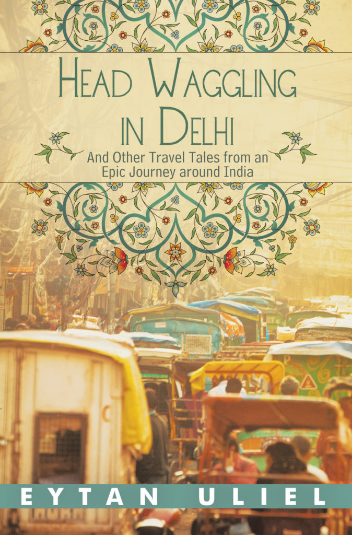Review By
Karen Rigby
Forward Reviews

In this accomplished travel memoir, India beguiles and repels and beguiles again.
Eytan Uliel’s Head Waggling in Delhi: And Other Travel Tales from an Epic Journey Around India revisits the Australian author’s tour through an ever-mystifying, contradictory subcontinent. With humorous candor, Uliel presents episodic memories. From remnants of the Raj in a Darjeeling hotel, to a boat ride on the Ganges, railway ticketing nightmares, and a bit part in a Bollywood film, his encounters highlight an unforgettable reminder: no matter how far from home you go, humans prove more alike than expected.
Covering a four-month-long backpacking trip in the 1990s, each chapter features a different city. Salient impressions and brushes with locals take the stage, allowing Uliel’s perceptions of India to collide with reality and to shift over time. Everyday moments take on new meaning against busy backdrops: finding challah in a bakery, watching televised cricket with a group of Indian men, and photographing a man at sunrise all reveal unexpected gifts.
Even disappointments prove illuminating. Udaipur, the site of a classic Bond film, is less alluring when its graffiticovered palace is seen up close. Global cities, such as Bangalore, seem dull to Uliel and his girlfriend, Camilla, when compared to villages that have retained their essence. At times, the search for a lesser-known, authentic India leads to sharp distinctions between backpackers and regular tourists. The latter are written large, in ways that tread between amusement and derision.
The book is refreshing in its honesty. It paints Uliel as a normal, flawed character who readily acknowledges the privileges of being a traveler while still being upfront about how difficult traveling can be. This is most evident in his near dust-ups with officious people. What Uliel dubs as “Indian logic”—a fastidious indirectness that sticks to bureaucratic rules—yields numerous scenes that are equal parts absurd comedy and embarrassing examples of impatience. And yet, for all the logistical tangles, train delays, illness, and rip-offs by people who overcharge him for services, there’s seldom a sense of harshness toward locals or regret. What stands out is an overwhelming eagerness to experience India’s breadth.
Sharp, engaging writing, an intelligent balance between grit and splendor, and carefully selected anecdotes bring India’s diversity to life. Threaded with fragments of history, the book is informative yet lively, provocative and funny. Without romanticizing the British colonial past or dwelling on poverty and injustice—perhaps clearest in an accidental stumble on a child market in the red light district—the book offers troubling moments, beauty, and wonder in abundance.
In this accomplished travel memoir, India beguiles and repels and beguiles again, resulting in a fascinating journey that is as eye opening as it is dreamlike.

Review By
Blue Ink Reviews

Great travel writers practice alchemy: synthesizing the sights, sounds and smells of their travels into a transcendent reading experience. Eytan Uliel showcases such skill in this memoir, Head Waggling in Delhi.
Uliel employs irony, humor, and humility to highlight the experiences of he and his girlfriend during their college days, backpacking throughout India in the mid-‘90s. Their adventure begins with a journey to Varanasi and continues to Darjeeling, Calcutta, Madras, Bangalore, and New Delhi. The title refers to the custom of head waggling that Uliel sees as a unique identifier of Indian culture: a physical gesture that punctuates conversations, sometimes to amplify it, other times to add irony to the tasks at hand.
Uliel constructs compelling descriptions of various destinations. But he’s is at his best when focusing on the couple’s often-exasperating challenges involving the country’s complexities. He skillfully captures the cadence and cacophony of dialects, and readers will easily be pulled into Uliel’s stories, such as their Gorakhpur Railway Station ticket-buying nightmare when every attempt to secure seats on the train to Varanasi was met with duplicity from the railway staff.
Generally, the author appears to relish the dichotomy of an India populace that seems to welcome tourists while also providing roadblocks to discourage them. But he’s clear-eyed about the stark realities of privilege that live alongside extreme poverty in Calcutta: “Hollywood had wanted me to believe that among Calcutta’s street people I would find noble souls triumphing against the odds…” he writes. “But when walking the real streets of Calcutta, I got to see for myself…how Western pop culture had chosen to romanticize what was, in reality, unmitigated human suffering.”
The author can be wordy; some crisp editing would have improved the book overall. And for readers who prefer a deep-dive into historical references, the book may come up short. But anyone who enjoys mixing a lighter dose of history with first-hand stories will find this is a literary masala worth the tasting.